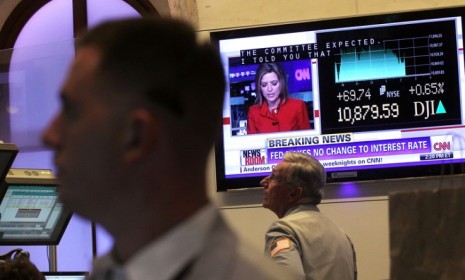The Fed's interest rate promise: 'Foolish'?
Ben Bernanke and Co. decide to keep banks' borrowing rate near zero until at least 2013. Will that really do anything to help the stuggling economy?

A free daily email with the biggest news stories of the day – and the best features from TheWeek.com
You are now subscribed
Your newsletter sign-up was successful
On Tuesday, the Federal Reserve responded to weeks of poor economic news — and an increasingly volatile stock market (which crashed more than 600 points Monday, jumped more than 400 points Tuesday, and then cratered more than 400 points Wednesday morning) — by pledging to keep interest rates near zero through the middle of 2013. That interest rate, which affects the costs of banks lending money to each other, essentially extends current fiscal policy for at least two years. Some, however, argue that borrowing costs aren't the major impediment to an economic rebound in the first place. Is this plan "foolish" or wise?
Bernanke's announcement is inconsequential: This doesn't do "much to alter economic or financial conditions," says Unicredit economist Harm Bandholz, as quoted by The Wall Street Journal. Investors already assumed interest rates wouldn't rise until late 2012 or early 2013, so this isn't exactly a major gamechanger. If anything, this long-term promise just limits the Fed's flexibility and options when responding to fiscal twists and turns in the future.
"Economists react: Fed 'bunts' with timeframe for low rates"
The Week
Escape your echo chamber. Get the facts behind the news, plus analysis from multiple perspectives.

Sign up for The Week's Free Newsletters
From our morning news briefing to a weekly Good News Newsletter, get the best of The Week delivered directly to your inbox.
From our morning news briefing to a weekly Good News Newsletter, get the best of The Week delivered directly to your inbox.
This might help... but not enough: While the market had a strong finish Tuesday, "it's doubtful that the Fed's move will be enough to increase employment and growth," says The New York Times in an editorial. On top of that, three members of the Fed's own policy committee opposed keeping rates low into 2013, and that's "particularly disturbing." Such opposition could hamper further efforts by the Fed to aid the flailing economy. The committee needs to take aggressive action to stimulate the economy, not "focus on combating inflation at a time when the economy is clearly not overheating."
Bernanke's interest rate promise is just the start: "An unprecedented number of dissenters vot[ed] against Bernanke's move," suggesting that "the mid-2013 language is just the start of what the chairman has up his sleeve and the inflation hawks want no part of it," says George Maniere at Benzinga. Expect Bernanke to make more major announcements later this month, and give "more details on what forms of stealth QE" — quantitative easing, a stimulative measure in which the Fed increases the supply of money in our economy — "he has in mind to support growth."
"Fed call wakes up global markets"
A free daily email with the biggest news stories of the day – and the best features from TheWeek.com
-
 Film reviews: ‘Send Help’ and ‘Private Life’
Film reviews: ‘Send Help’ and ‘Private Life’Feature An office doormat is stranded alone with her awful boss and a frazzled therapist turns amateur murder investigator
-
 Movies to watch in February
Movies to watch in Februarythe week recommends Time travelers, multiverse hoppers and an Iraqi parable highlight this month’s offerings during the depths of winter
-
 ICE’s facial scanning is the tip of the surveillance iceberg
ICE’s facial scanning is the tip of the surveillance icebergIN THE SPOTLIGHT Federal troops are increasingly turning to high-tech tracking tools that push the boundaries of personal privacy